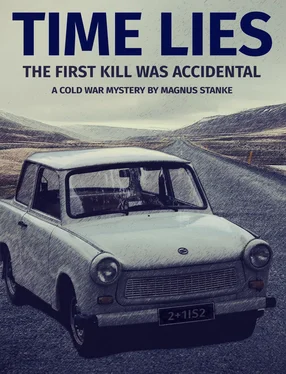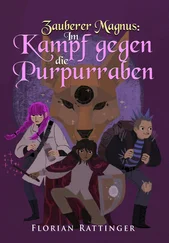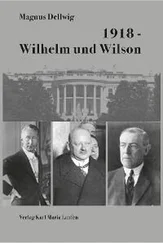Something else happens. He feels alone again, as though the man with the wig has abandoned him here after all, left him to languish in a room-sized grave. The fridge is nearly empty. The bread is long gone and only one egg remains; the milk went sour a while ago. Will his jailor show himself at last if he runs out of food entirely?
Not so fast. Best not to dwell upon events that you can’t control, Karl thinks, returning the last egg to the mould in the door of the refrigerator. The man will show himself when I’m ready for him, when I have earned him. There is plenty of dry food in the cupboard, rice and pasta, some canned goods. For now a biscuit will do.
Decision made. Cookie in hand, images of his childhood invade his stimulus-starved brain, images of the 1950s, when socialism was still taking hold in the recently founded German Democratic Republic. Pictures of his deceased father, working class hero and unassailable symbol of resistance against the forces of the imperialist class-enemy, the capitalists’ never-ending attempts to make inroads into Eastern Europe, Karl and, Mamochka full of zeal for the socialist ideas, and the rich aroma of homemade cookies he smelled rather than ate. Looking back he realises that he felt guilty then, guilty when his mum cried for no reason at all; guilty enough to take a huge bite and smile at her, pretend he cherished the taste, just don’t cry anymore, please.
He now opens the tin and takes out a cookie.
‘Comrade Mother, tovarich Mamochka…’ he says.
He takes a bite and falls asleep soon after he starts to chew.
*
When he wakes up he is in bed, the tin stored away, and he notices the chemical taste on his tongue.
So that’s it. Drugged again. It’s the cookies.
He gets out of bed, slowly, feels his head spinning and forgets why he got up.
Water. To drink water and flush down the foul taste.
When he opens the door to the fridge it is as full of food as it was on the first day. Somebody is watching out for him. But he is not about to find out who, not for a while.
Darkness descended on the land early at this time of the year. Outside the snow fell silently and abundantly. Welcome to hell on earth, Albert thought. The air was full of Christmas carols being bludgeoned by tone-deaf, impatient children blowing saliva-soaked breath into cheap recorders, going over the first few bars of ‘Silent Night’ or ‘O Tannenbaum’ endlessly like broken records, though certainly not those in his carefully curated collection. For the little ones Christmas couldn’t come fast enough.
Albert prayed it would never come again.
That morning, the last Sunday of Advent before Christmas, his identical twin Tobias brought breakfast to Albert’s room, a cup of steaming hot, milky tea, two slices of bread with quark and marmalade and a glass of orange juice. He stuck around to make sure that Albert ate it all, hoping against hope to see his brother’s winning smile, or at least a glimpse of it.
Three long years had passed since the accident, three years full of dread and death and desperation, three years that felt like three hundred to Albert; he, who hardly ventured out into the world anymore, not even into the small, contained realm that had been his life before the accident; he, who had walked like a king among his subjects.
After the accident life had gone to pieces and so had Albert. Thank God Tobias had kept things together as far as the house and the company were concerned. Yes, Tobi had really come through, pulled more than his weight, had taken over the day-to-day running of the factory much more smoothly than expected. Three or four days a week he got into Albert’s wheelchair and clothes and let the chauffeur drive him to the office where nobody even suspected that it was Tobi giving the orders, not Albert.
Thanks to a nosy nurse who had since been fired, everybody in Eschershausen knew that Albert could actually walk again, had full control of his legs and simply chose not to use them. It didn’t matter. Where was there to go? The graveyard was just next door, and all other places of any interest — the past, mostly — were in his head. Legs were optional.
Albert knew that the next two weeks would be the worst of the year. Everything reminded him of the time just before the accident, of everything he had lost. Because of the accident his heart would break all over again, day after day, year after year. He didn’t think he could get through this season once again, God willing or not. If his life before the accident had been less perfect, more like Tobias’ life, say, maybe he would be better prepared to cope now. As it was, he was too weak, too spoilt to deal with the loss and the sense of guilt he carried. He simply wasn’t conditioned for these emotions. Not even the faith that he had finally embraced seemed to help much.
Growing up in the Federal State of Lower Saxony on the Ith, the nearby mountain range, had been a safe, idyllic experience. According to legend the Pied Piper of Hamelin had once lured a bunch of children away from their homes and brought them to the Ith, but that was but an ancient myth. In Albert’s experience this place was one of the cosiest in the world.
In Eschershausen the Catholics made up about a third of the population, a tightly knit, highly observant micro community who adhered to their laws with an almost Protestant zeal. There was room for everybody as long as you were Roman-Catholic, not divorced, obviously, and a regular churchgoer. People knew each other by name and reputation, the families getting together multiple times a year. Easter, First Communion, Confirmation, camping in summer – altar boys only – and barbecues when the weather allowed it; Corpus Christi was popular with the children as they were excused from classes. The Hoffmanns were not exactly great Catholics, but they went through the motions with sufficient regularity to be considered part of the flock.
The twin’s mother died giving birth to Tobias who was born minutes after Albert, but their father Gerhardt had done a grand job bringing them up by himself. He had taken part-time work locally to dedicate himself fully to their care. They hadn’t been rich, of course, but they had never wanted for anything, never gone hungry or cold; Dad made sure of that. Albert even had enough pocket money to start his record collection after a chance encounter with Elvis Presley, the King of Rock’n’Roll, when Albert was a child.
Life in the small town had been charmed, everything he could have hoped for. His place in the pecking order was firmly established early on and his universal popularity was never questioned. School had been a breeze and he was spared military service. Of course the girls had always swooned over Albert. He fondly remembered his first, a beauty called Senta, who plucked his virginity like a ripe plum when he was twelve and she sixteen. After that, his ubiquitous conquests were a blur – until, of course, he settled for Cordula.
Cordula Schwaiger had been in Albert’s class from his first day in school. Unlike him, she came from a wealthy family; her father was in concrete and owned the largest company in Eschershausen. For many years Albert wouldn’t give Cordi the time of day, and in hindsight that was right and proper, the way it was supposed to be. It had given him the chance to experiment sexually at will without ever having to feel bad about it. He never betrayed Cordula.
Until then he coaxed, begged and demanded sex from practically every female around, though in most cases he didn’t have to. It came easy. In fact, it came so easy that sometimes Albert passed it on — never up — to his brother. The twins looked identical and always knew what the other was feeling. Still, they couldn’t have been more different inside if they tried. Where Albert excelled, Tobi struggled or failed outright, except when it came to impersonating his brother. This was possibly Tobias’ greatest skill. Switching identities had been their favourite pastime from the day they could walk. Their second favourite game was this:
Читать дальше












